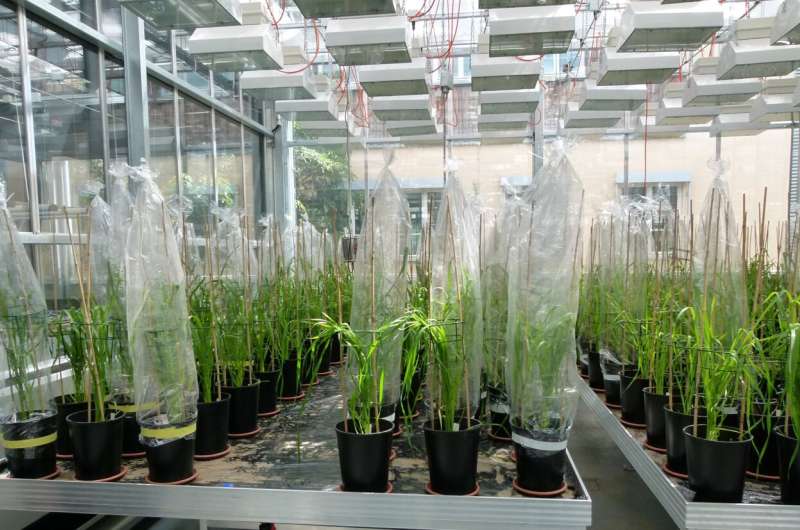This article has been reviewed according to Science X's editorial process and policies. Editors have highlighted the following attributes while ensuring the content's credibility:
fact-checked
proofread
Insights for plant breeding: Arming wheat plants against climate stress with microorganisms

Agriculture in Europe is increasingly affected by extreme weather conditions that lead to crop losses. In 2018, the damage in Germany alone amounted to around 770 million euros. Making wheat plants more resilient to these stresses could make a significant contribution to safeguarding global food production.
As part of the VolCorn project, scientists from four non-university research institutions have been studying, from very different perspectives, how wheat plants and the microorganisms such as fungi and bacteria that colonize them respond to stress factors caused by extreme weather conditions such as drought, flooding or pests.
The underlying assumption is that the microbiota, the community of microorganisms in and around the plant, is as important to the plant as microorganisms are to the human immune system. A better understanding of these interactions is therefore central to better preparing plants for these stress situations.
Volatile organic compounds (VOCs), which are produced by the plant and also used to "communicate" with the microbiota, play a key role in the plant's defense against these stressors. The researchers have used modern approaches to unravel these complex relationships. They used systems biology methods to study changes in plant metabolism and, at the same time, changes in the microbiota.
Microorganisms can help with climate stress
The research shows that floods and droughts not only generally reduce the growth and yield of wheat, but also change the microbiota in the roots and leaves. In particular, more pathogenic microbes colonize the early growth stages. As a result, stressed plants become more susceptible to disease.
To the researchers' surprise, however, beneficial bacteria also accumulate in the root zone during flooding, promoting the uptake of nutrients and vitamins by the plant. At the same time, the plant itself massively changes its metabolism.
The researchers were able to show that the amino acid alanine plays a central role in maintaining nitrogen supply and metabolism in the stressed plants. "Presumably, the altered microbiota then makes more supporting vitamins available to support the weakened wheat metabolism in the root zone," explains project coordinator Steffen Kolb from ZALF.
Pest infestations affect the formation of VOCs by the wheat plant, which reacts to this form of stress with a defense response. The project also led to the development of a new tool for data analysis of complex mixtures of different VOCs using mass spectrometry, which will speed up follow-up studies.
New insights help breeders and farmers
"We hope that in the future we will be able to selectively enrich microbes and their plant-supporting properties to make wheat plants more resilient to climate change, such as flood stress," says Kolb. In plant breeding, for example, work is already underway on programs that encourage plant colonization with supportive microorganisms from the surrounding soil. Another example is the transfer of stress-reducing microorganisms to wheat plants.
"The knowledge gained from the multifaceted response of the wheat plant and its microbiota is of great importance for the breeding of climate-resistant wheat varieties and will open new avenues for the systematic management of microorganisms in agricultural crop production. However, further experimental research is needed due to the complex relationships involved," said the project coordinator.
Provided by Leibniz-Zentrum für Agrarlandschaftsforschung (ZALF) e.V.





















